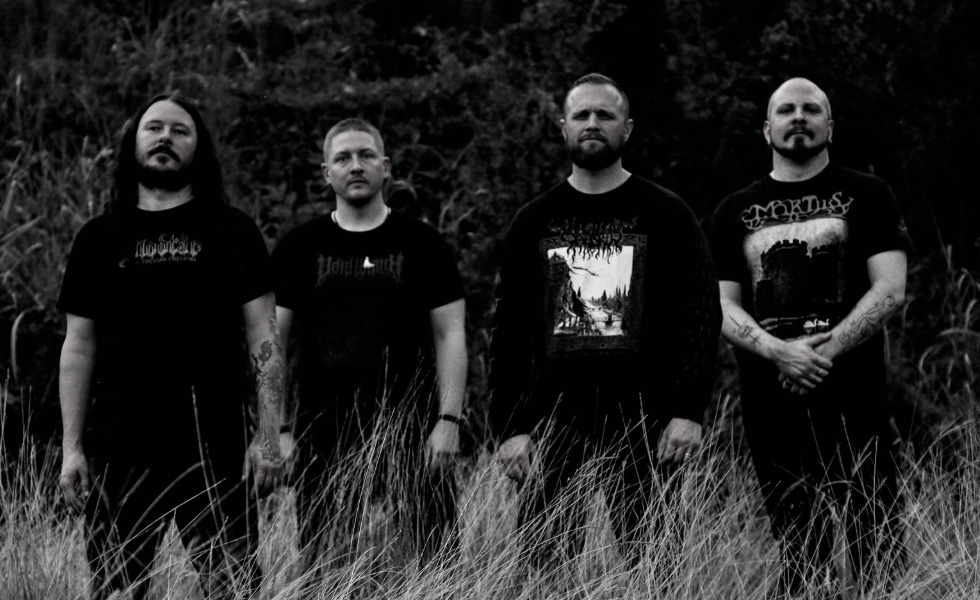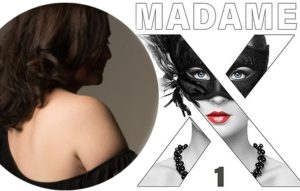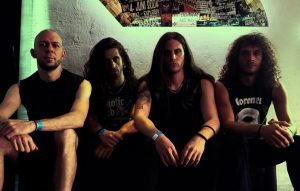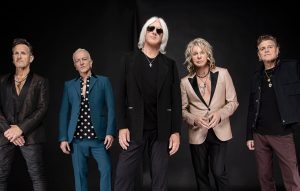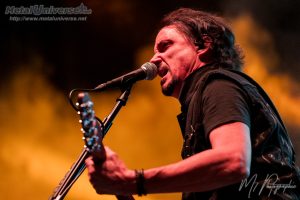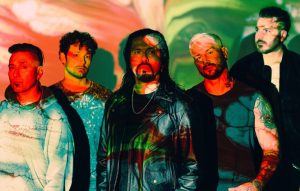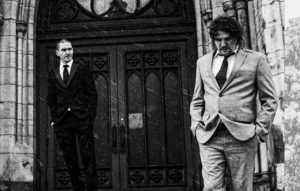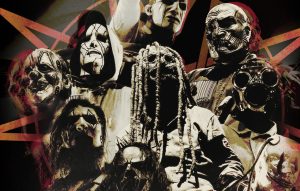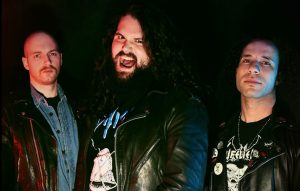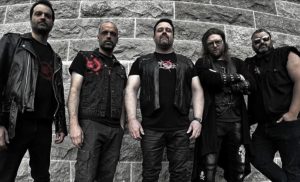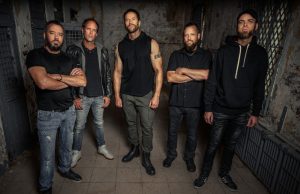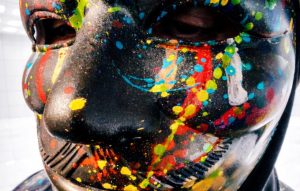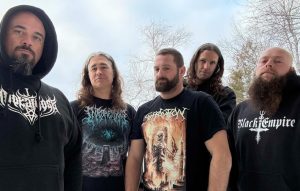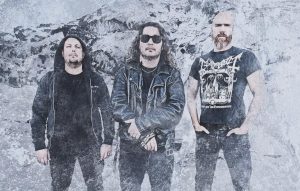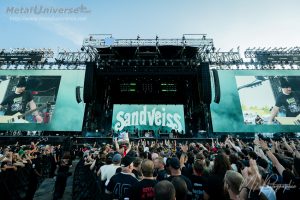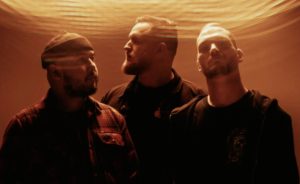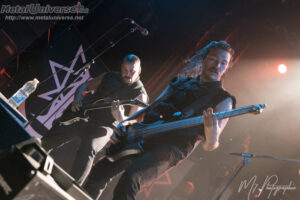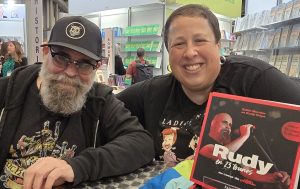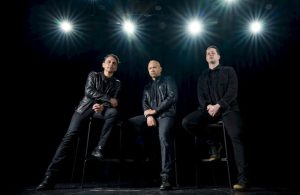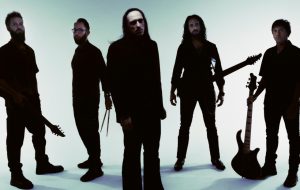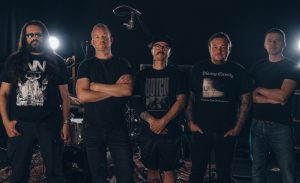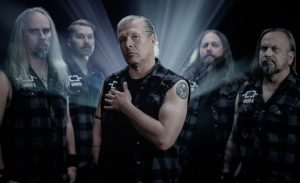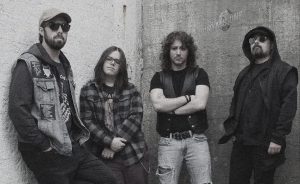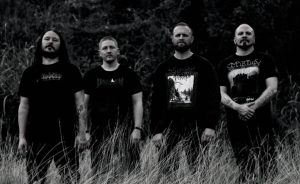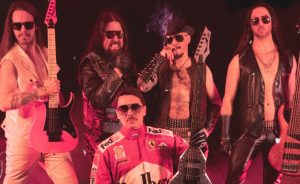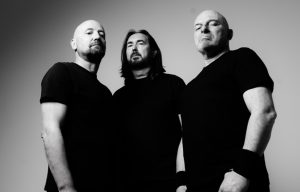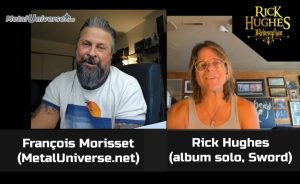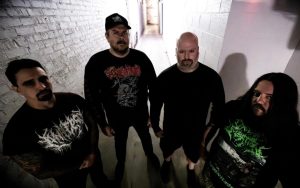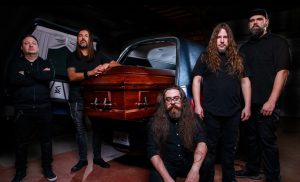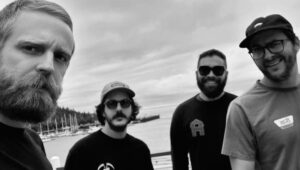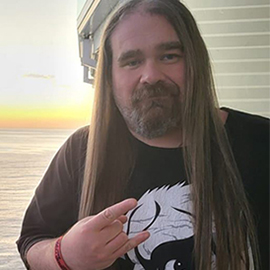
[Propriétaire MU Média – MetalUniverse.net]
Entrevue avec Krigsgrav
Par Marc Desgagné (MetalUniverse.net, Québec – Canada)
Le groupe texan Krigsgrav revient en force avec son nouvel album Stormcaller, lancé le 19 septembre 2025 sous Willowtip Records. En puisant dans la noirceur du black metal et la lourdeur émotionnelle du doom, le quatuor livre un disque à la fois intense, mélancolique et atmosphérique, qui marque un nouveau sommet dans sa carrière.
Pour MetalUniverse.net, Marc Desgagné s’est entretenu avec David Sikora (batterie, chant clair) afin d’en savoir plus sur la création de Stormcaller, la collaboration renouvelée avec Owe Inborr (Wolfthrone Studios), le superbe visuel d’Adam Burke, et l’évolution constante du groupe à travers les années. L’entretien aborde également les thèmes profonds qui traversent l’album — la nature, la mort, la renaissance et la résilience — ainsi que la manière dont les réalités du monde actuel se reflètent dans leur musique.
[ english follows ]
MU : Tout d’abord, merci d’avoir pris le temps de nous parler, et félicitations pour la sortie de Stormcaller! L’album reçoit d’excellentes critiques depuis sa sortie chez Willowtip Records, certains allant même jusqu’à dire qu’il s’agit de votre œuvre la plus forte à ce jour. Comment réagissez-vous à un tel accueil, autant du côté des fans que des critiques?
David Sikora : Avant tout, merci beaucoup pour l’entrevue et pour vos bons mots. Ce que nous essayons toujours d’atteindre dans notre musique, c’est une forme d’authenticité personnelle. À chaque album, nous écrivons simplement ce que nous voulons entendre à ce moment précis, en ayant confiance que ça sonnera toujours comme du Krigsgrav. Nous faisons un album que nous voulons écouter, et si le public l’apprécie aussi, c’est un merveilleux bonus. Il est naturel d’être heureux de recevoir une telle validation, et jusqu’à maintenant, les commentaires ont été excellents.
MU : Vous avez mentionné que l’objectif avec Stormcaller était de créer « l’album le plus complet de Krigsgrav », en réunissant des éléments de toutes les époques du groupe. Comment cette idée a-t-elle influencé l’écriture?
David Sikora : En réalité, c’était plutôt l’inverse. Les idées et les démos que nous travaillions nous ont fait réaliser que les nouvelles chansons contenaient déjà un peu de chaque “ère” de Krigsgrav. Nous avons donc simplement suivi cette direction naturelle sans forcer les choses. Les nouvelles idées finissent toujours par nous révéler, d’elles-mêmes, ce que sera le prochain album.
MU : Combien de temps a duré le processus créatif de Stormcaller, du premier riff au mix final? Était-ce un parcours fluide ou avez-vous traversé des moments de doute ou d’expérimentation?
David Sikora : Nous n’arrêtons jamais vraiment d’écrire. Comme nous jouons rarement en concert et que nous ne faisons pas de tournée, nous nous consacrons pleinement à la création. J’ai enregistré les batteries en décembre 2024, et tout l’enregistrement s’est terminé en avril 2025. Le mix et le mastering ont ensuite pris quelques semaines. En tout, le processus complet s’est terminé en mai 2025, mais l’écriture, elle, s’est étendue sur plus d’un an.
MU : Durant la création de Stormcaller, y a-t-il eu un moment particulier en studio où vous avez senti que cet album serait spécial?
David Sikora : Oui, probablement lorsque nous avons entendu les chansons avec les solos de guitare et surtout les lignes de basse ajoutées. Beaucoup de nos démos n’ont que des basses de base, voire aucune. Quand Wes a ajouté ses lignes de basse, tout a pris vie et a atteint une dimension supérieure.
MU : Vous avez à nouveau collaboré avec Owe Inborr (Wolfthrone Studios) pour le mix et le mastering. Qu’est-ce qui rend cette collaboration si naturelle pour Stormcaller?
David Sikora : Cet album est à la fois une continuité et une conclusion logique de notre trilogie amorcée avec The Sundering et Fires in the Fall. Le style d’Owe, très immersif et massif, convenait parfaitement pour amplifier la grandeur et l’intensité de nos nouvelles compositions.
MU : Après toutes ces années ensemble, comment décririez-vous l’évolution de Krigsgrav, tant sur le plan musical que dans la chimie entre les membres?
David Sikora : La formation actuelle est sans doute la meilleure que nous ayons eue, tant sur le plan musical que relationnel. Tous les anciens membres ont contribué à notre évolution, et nous leur en sommes profondément reconnaissants. De 2004 à 2012, j’écrivais et jouais tout moi-même, mais depuis que Krigsgrav est devenu un vrai groupe, notre son n’a cessé d’évoluer. Et ça, c’est très stimulant.
MU : Quelle est la plus grande difficulté à rester fidèle à votre essence tout en continuant d’évoluer?
David Sikora : Nous essayons simplement de ne pas trop réfléchir. Nous faisons confiance à notre instinct. Si une idée sonne comme du Krigsgrav, c’est tout ce qui compte. Le black metal fera toujours partie de notre identité, mais son intensité variera selon les morceaux.
MU : Stormcaller mélange l’intensité du black metal avec le poids et l’émotion du doom. Qu’est-ce qui vous pousse à explorer cette dualité?
David Sikora : Nous avons toujours intégré des sections plus lentes, mais c’est sur Leave No Path to Follow (2018) que nous avons pleinement embrassé notre côté doom. Depuis, ces éléments se sont naturellement intégrés à notre son. J’aime cette dualité entre lenteur et agressivité; elle maintient l’intérêt et évite la prévisibilité.
MU : Sur le plan lyrique, l’album évoque la nature, la mort et le renouveau. Ces thèmes sont-ils personnels ou conceptuels?
David Sikora : Un peu des deux. Certains d’entre nous ont des enfants, et cela influence beaucoup nos textes. On ressent à la fois l’inquiétude et l’espoir pour leur avenir. Ces émotions — la peur, la colère, la tristesse, mais aussi l’espoir — forment le cœur de nos paroles, souvent enveloppées de métaphores.
MU : La pochette d’Adam Burke (Nightjar Illustration) est superbe. Quelle en est la signification?
David Sikora : C’est un heureux hasard! Notre chanteur Justin avait déjà le titre Stormcaller en tête quand j’ai vu cette œuvre d’Adam sur Instagram. Elle représentait parfaitement l’esprit de l’album. Nous avons donc acheté les droits, et tout s’est aligné naturellement.
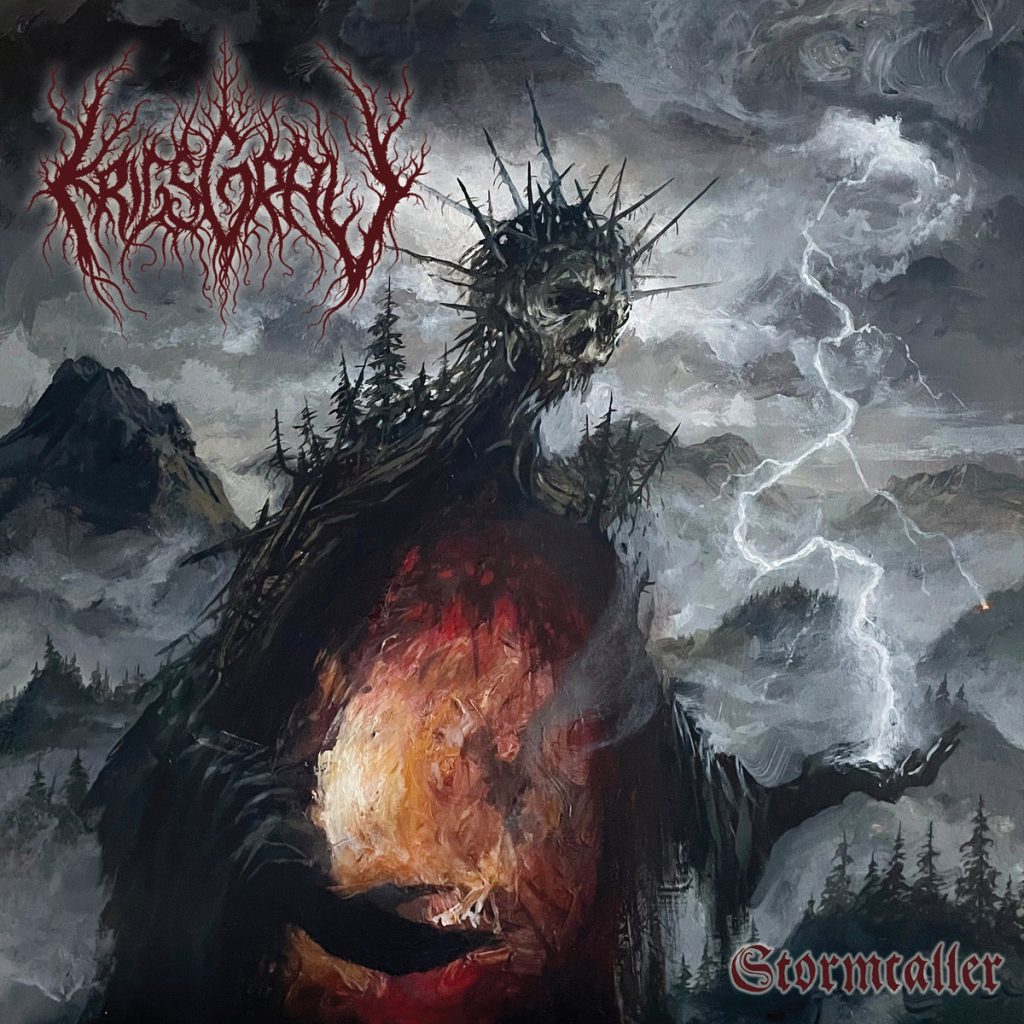
Liste des pièces:
01. Huntress of the Fire Moon (feat. Jens Rydén)
02. Stormcaller
03. Twilight Fell
04. None Shall Remember Your Name
05. Bay of the Barghest
06. The Tonic of Wilderness
07. Ghosts
08. Womb:Death:Dawn
MU : Le titre Stormcaller évoque la puissance et la transformation. Que signifie-t-il pour vous?
David Sikora : C’est une métaphore de la destruction et de la renaissance. Une colère tournée vers les travers de l’humanité et le désir de tout reconstruire après le chaos — une sorte de purge nécessaire pour repartir à neuf.
MU : La pièce d’ouverture, Huntress of the Fire Moon, avec Jens Rydén, crée une ambiance marquante. Comment est née cette collaboration?
David Sikora : Nous voulions dès le départ inviter un chanteur invité, et Jens Rydén (Thyrfing, Naglfar) nous est vite venu en tête. Nous l’avons contacté, et il a accepté. Il a livré une performance incroyable — l’entendre échanger des lignes vocales avec Justin, c’était un rêve devenu réalité.
MU : Plusieurs voient Stormcaller comme un tournant pour Krigsgrav. Êtes-vous du même avis?
David Sikora : Oui, on le voit comme la fin d’un cycle. Nous ne voulions pas faire un Fires in the Fall Part II, et encore moins un Stormcaller Part II. Nous savons déjà quelle direction emprunter pour le prochain chapitre de Krigsgrav.
MU : Vos compositions sont chargées d’émotions. Qu’est-ce qui vous inspire le plus?
David Sikora : Ces dernières années, ce sont surtout les temps présents et nos expériences personnelles. Nous ne sommes pas un groupe politique, mais il est difficile d’ignorer ce qui se passe dans le monde. Nos chansons sont des réactions émotionnelles à cette réalité.
MU : Si vous deviez décrire Stormcaller en une phrase à quelqu’un qui découvre Krigsgrav pour la première fois?
David Sikora : Huit chansons, cinquante minutes de metal extrême à la fois lourd, épique et mélodique — entre black, death et doom — avec une grande production, des refrains puissants et une intensité émotionnelle palpable.
MU : Quels sont vos plans de tournée après la sortie de l’album? Avez-vous des projets de venir au Canada ou au Québec?
David Sikora : Nous adorerions, mais nos vies professionnelles et familiales rendent les tournées difficiles. Nous avons fait une tournée en 2016, et nous prévoyons quelques spectacles en 2026 pour enfin jouer Stormcaller sur scène. Ce serait dommage de ne pas le faire.
MU : Si Stormcaller était un film, quel réalisateur ou quelle ambiance le représenterait le mieux?
David Sikora : Probablement John Hillcoat, pour son adaptation de The Road. Il a su capturer une atmosphère désespérée et apocalyptique qui correspond bien à l’univers que notre musique évoque.
MU : Enfin, un dernier mot pour les lecteurs et les fans qui vous suivent depuis le début?
David Sikora : Merci encore pour cette entrevue. Et surtout, merci à tous ceux qui ont écouté Krigsgrav, depuis nos débuts ou plus récemment. Votre soutien compte énormément pour nous. Nous avons encore beaucoup de musique à offrir dans les années à venir!
Facebook: https://www.facebook.com/krigsgrav
Instagram: https://www.instagram.com/krigsgrav_official/
Bandcamp: https://krigsgrav.bandcamp.com/
Playlist YouTube:
ENGLISH version
Interview with Krigsgrav
By Marc Desgagné (MetalUniverse.net, Québec – Canada)
The Texas-based band Krigsgrav returns in full force with their new album Stormcaller, released on September 19, 2025, via Willowtip Records. Drawing from the darkness of black metal and the emotional weight of doom, the quartet delivers an intense, melancholic, and atmospheric record that stands as a new pinnacle in their career.
For MetalUniverse.net, Marc Desgagné spoke with David Sikora (drums, clean vocals) to learn more about the creation of Stormcaller, the renewed collaboration with Owe Inborr (Wolfthrone Studios), the stunning artwork by Adam Burke, and the band’s ongoing evolution over the years. The interview also explores the deeper themes running through the album — nature, death, rebirth, and resilience — as well as how today’s world finds reflection in their music.
MU: First of all, thank you for taking the time to talk with us, and congratulations on the release of Stormcaller! The album has been receiving excellent reviews since its release on Willowtip Records, with some even calling it your strongest work to date. How do you react to such an enthusiastic response from both fans and critics?
David Sikora: First of all, thank you very much for the interview and for your kind words. What we always try to achieve in our music is a sense of personal authenticity. With every album, we simply write what we want to hear at that precise moment, trusting that it will always sound like Krigsgrav. We make an album that we want to listen to, and if the audience enjoys it too, that’s a wonderful bonus. It’s natural to feel happy about such validation, and so far, the feedback has been fantastic.
MU: You mentioned that the goal with Stormcaller was to create “the most complete Krigsgrav album,” bringing together elements from all of the band’s eras. How did that idea influence the writing process?
David Sikora: In reality, it was more the other way around. The ideas and demos we were working on made us realize that the new songs already contained a bit of every “era” of Krigsgrav. So, we just followed that natural direction without forcing anything. New ideas always reveal to us, on their own, what the next album will become.
MU: How long did the creative process for Stormcaller take, from the first riff to the final mix? Was it a smooth process, or did you go through moments of doubt or experimentation?
David Sikora: We never really stop writing. Since we rarely play live and don’t tour, we can dedicate ourselves fully to creating. I recorded the drums in December 2024, and the recording was completed in April 2025. Mixing and mastering took a few more weeks. The entire process wrapped up in May 2025, though the writing itself had spanned more than a year.
MU: During the making of Stormcaller, was there a particular moment in the studio when you realized this album would be something special?
David Sikora: Yes, probably when we heard the songs with the guitar solos and especially the added bass lines. A lot of our demos only have basic or no bass at all. When Wes added his bass tracks, everything came alive and reached a higher dimension.
MU: You once again worked with Owe Inborr (Wolfthrone Studios) for the mix and mastering. What makes this collaboration feel so natural for Stormcaller?
David Sikora: This album is both a continuation and a logical conclusion to the trilogy we began with The Sundering and Fires in the Fall. Owe’s immersive and massive production style was perfect for amplifying the grandeur and intensity of our new material.
MU: After all these years together, how would you describe Krigsgrav’s evolution, both musically and in terms of chemistry between members?
David Sikora: The current lineup is probably the best we’ve ever had, both musically and personally. Every past member has contributed to our growth, and we’re deeply grateful for that. From 2004 to 2012, I wrote and played everything myself, but since Krigsgrav became a real band, our sound has continually evolved — and that’s incredibly exciting.
MU: What’s the biggest challenge in staying true to your essence while continuing to evolve?
David Sikora: We try not to overthink it. We just trust our instincts. If an idea sounds like Krigsgrav, that’s all that matters. Black metal will always be part of our identity, though its intensity may vary from song to song.
MU: Stormcaller blends the intensity of black metal with the emotional weight of doom. What drives you to explore that duality?
David Sikora: We’ve always included slower sections, but it was on Leave No Path to Follow (2018) that we fully embraced our doom side. Since then, those elements have naturally integrated into our sound. I love that contrast between slowness and aggression — it keeps things interesting and avoids predictability.
MU: Lyrically, the album touches on nature, death, and renewal. Are these themes personal or more conceptual?
David Sikora: A bit of both. Some of us have children, and that heavily influences our lyrics. There’s both worry and hope for their future. Those emotions — fear, anger, sadness, but also hope — form the core of our writing, often wrapped in metaphor.
MU: The artwork by Adam Burke (Nightjar Illustration) is stunning. What’s the story behind it?
David Sikora: It was a happy accident! Our vocalist Justin already had the title Stormcaller in mind when I saw that piece by Adam on Instagram. It perfectly represented the spirit of the album. We purchased the rights, and everything fell into place naturally.
MU: The title Stormcaller evokes power and transformation. What does it mean to you personally?
David Sikora: It’s a metaphor for destruction and rebirth. A fury directed at humanity’s flaws and a desire to rebuild after the chaos — a sort of necessary purge to start anew.
MU: The opening track, Huntress of the Fire Moon, featuring Jens Rydén, creates a powerful atmosphere. How did that collaboration come about?
David Sikora: We knew from the start that we wanted a guest vocalist, and Jens Rydén (Thyrfing, Naglfar) quickly came to mind. We reached out, and he agreed. His performance was incredible — hearing him trade vocal lines with Justin was a dream come true.
MU: Many see Stormcaller as a turning point for Krigsgrav. Would you agree?
David Sikora: Yes, we see it as the end of a cycle. We didn’t want to make Fires in the Fall Part II, and certainly not Stormcaller Part II. We already have a sense of where we want to go for the next chapter of Krigsgrav.
MU: Your songs are deeply emotional. What inspires you the most these days?
David Sikora: Lately, it’s mostly the present times and our personal experiences. We’re not a political band, but it’s hard to ignore what’s happening in the world. Our songs are emotional reactions to that reality.
MU: If you had to describe Stormcaller in one sentence to someone discovering Krigsgrav for the first time, what would you say?
David Sikora: Eight songs, fifty minutes of extreme metal that’s heavy, epic, and melodic — a blend of black, death, and doom — with powerful production, strong choruses, and palpable emotional intensity.
MU: Do you have any touring plans following the album’s release? Any chance of coming to Canada or Québec?
David Sikora: We’d love to, but our professional and family lives make touring difficult. We did one tour back in 2016, and we’re planning a few shows in 2026 to finally play Stormcaller live. It would be a shame not to.
MU: If Stormcaller were a film, which director or atmosphere would best represent it?
David Sikora: Probably John Hillcoat, for his adaptation of The Road. He captured a desperate, apocalyptic atmosphere that fits perfectly with the world our music evokes.
MU: Finally, any last words for the readers and fans who’ve followed you from the beginning?
David Sikora: Thank you again for this interview. And most of all, thank you to everyone who’s listened to Krigsgrav — whether since the early days or more recently. Your support means the world to us. We still have a lot of music left to give in the years to come!
